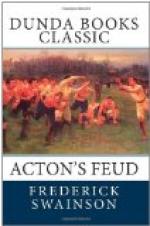“I say,” said Bourne to me, “what’s come over Todd? Blessed if that usual ass didn’t handle the Fifth v. Sixth to-day simply beautifully. When you’re lynched, Gus will fill your shoes completely. Talks so-so, too. Who’s improving him?”
I acted on Phil’s advice, and Todd and I parcelled out the outstanding fixtures between us. Then Todd became one of the best-known fellows in the school, and strolled up the hill with Worcester, Acton, Vercoe, and other heroes as to the manner born. The old, lazy, shallow, shifty, shiftless Gus was drifting into the background every day.
Then Todd gave us a final shock. I was hurrying down the High when a constable asked me if I could tell him “where a young gentleman named Todd lived.”
“I’m passing by his house,” said I, more than a trifle puzzled as to what the police might want with Gus. “Hope it isn’t house-breaking, constable?”
“No, sir,” said he, laughing. “It is a matter of ice-breakin’.”
I expect I looked mystified.
“Mr. Todd, sir, fished out of the water just below the Low Locks a common ordinary drunk, Robins—a bargee. That was yesterday afternoon, and this morning the superintendent sends me to see how he is.”
I looked more blankly ignorant than before.
“He’s kept it dark, I see, sir. There isn’t a bigger fool alive than Robins when he’s drunk—which he mostly—what is—and he acted yesterday up to the usual form of drunks. He would go on the ice just below the locks, when it would hardly bear a sparrer, let alone a drunk Robin, and he naturally goes under before he’d gone a dozen yards. Mr. Todd went for him without, I fancy, considering the risks. He broke the ice up to that forsaken Robins, and waded in after him. When we got there he was up to his neck in water, and he’d got the fool by the collar; then we pulled ’em both out. Mind, up to his chin in that frozen water! We thought Robins was a goner from cold when we landed ’im, and asked Mr. Todd’s name as bein’ likely to be required at the inquest. But, bless you, sir, Robins pulled through all right; that sort generally does.”
“Was there any one to help Todd, when he went for the fellow?”
“No, sir; he just waded in and took his chance. I wouldn’t—at least not for an ord’nary drunk. Mr. Todd just ran home as he was: said the sprint would warm him to rights. How is he?”
“Got a vile cold; he was barking pretty well all chapel.”
“And Robins,” said the policeman, in disgust, “doesn’t own up to a snuffle. This Mr. Todd’s house, sir?”
“Yes. I’d just ask to see Mr. Taylor, the house-master, first. I fancy he’ll be pleased to see you.”
The constable’s plain, unvarnished tale gave the Rev. E. Taylor as pleasant a ten minutes as he had enjoyed for some time, and he passed on the worthy man to the butler with instructions as to “something hot.” Then he rapped on Todd’s door.




